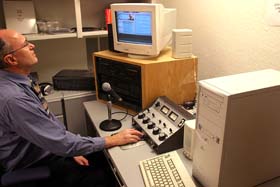Future of low-powered Logan radio station is up in the air
Logan City’s radio station may soon get a helping hand from the Hispanic community and Utah State University broadcast students if the city council provides the funding.
The city’s radio station, 106.1 FM, currently broadcasts an eclectic mix of music and announces city events. Logan Library director Ronald Jenkins, who heads the radio station, and Mayor Doug Thompson are looking into giving time blocks to the Hispanic community for Spanish programming. Time may also be given to USU broadcast students to give them experience in recorded or live radio broadcasts.
Luis Espinoza, a Logan resident who runs Casas y Cosas Magazine, said there are about 12,600 Hispanics in Cache County.
“There’s a whole load of them in the county, that’s a very good, viable market to market to,” Espinoza said. “There is a definite need for communication.
We’ll be able to blanket the community and provide it with information on resources available, so they know what to do and where to do it.
Espinoza said he would like to see the station have some music and programs to interest young Latinos, and some to bring in an older audience. Although about 80 percent of Cache Valley Hispanics are of Mexican descent, Espinoza said, the plan is to attract all Hispanic cultures in the valley.
“It has to be across the board, not only to Mexicans but to Brazilians, Chileans, and across the board,” Espinoza said. “We’ll talk about the holidays of one country or the politics of another country, and the music will be combined.”
Jenkins said the station has been operating less than a year and is a 100-watt broadcast, meaning it broadcasts clearly over a radius of about 3.5 miles.
This type of low-power FM station has only been permitted for two years, Jenkins said, so there isn’t much precedence on how it should be used.
“It’s virgin territory,” Jenkins said. “We’re trying to take advantage of it. We don’t know how it should end up, but there’s potential.”
Espinoza said he heard several city council members may be reluctant to give the station enough funding this summer because of budget concerns.
“Our task is to show them there’s another way of doing the radio station and make it beneficial to the community,” he said. “[Radio] is a lot cheaper than TV, but it’s effective because lots of Latinos listen to radio.”
The mayor is reviewing the possibilities now, Jenkins said, and in June the council will decide whether or not to approve the $15- to $20 thousand annual budget for the station
But the mayor said he is not optimistic.
“There are a couple council members with real strong feelings against it,” Thompson said. “[We may be] losing a very important opportunity for just a few dollars. This may be the only thing that can keep [the station] going.
“We have virtually no budget,” Jenkins said. “We’re in the budget process and looking for interested parties, ideas, suggestions and proposals.”
The station is nonprofit and cannot use advertising, Jenkins said, but it can have sponsors who donate money.
Espinoza said the idea to have Spanish radio came from Juan Luna, who recently received the diversity award at the Utah Conference of Educators. When the Hispanic Business Council and the Health Council found out how expensive a station can be and heard the city station may be a possibility, everyone on the councils supported the idea, Espinoza said.
The Hispanic Business Council has approached several major businesses in the valley that expressed interest in the station. Espinoza said they need the support of USU and perhaps high school students as well.
“We want to approach many students studying broadcast journalism and provide them radio time and get some experience and do some programming,” he said. “I think all around, the idea is a very viable idea, it’s a doable thing, it’s just a matter of convincing officials to give us a chance to do it.”
Espinoza said Logan is fortunate to not have gang-related problems like Salt Lake City and Ogden, and the station can be a way to prevent these problems.
“[The station can] teach each community how to get out of poverty, get education, and the only way to do that is the mass media,” Espinoza said.
Espinoza said the programming may someday include other cultures, such as Asian, Tongan and Samoan. He said the mayor, Jenkins and those interested in promoting Spanish programming will meet Wednesday to put together a plan for the city council.
-heidithue@cc.usu.edu

